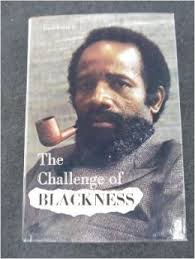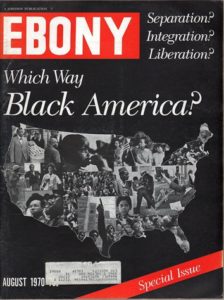Spurred on by L.D. Burnett’s fantastic post yesterday on primary sources and 1970s feminist books (seriously, check it out now if you haven’t already done so), I looked back towards some of the books from that era I’ve used in my own research. Among those is a beat up copy of Lerone Bennett’s The Challenge of Blackness, a collection of essays published in 1970. Many of the essays in that collection were originally published in Ebony magazine while Bennett was editor. Still others were from speeches and talks he gave to various black-oriented organizations in the late 1960s. Reading through the marked-up essays, I began to think about one that would actually come out in 1970 and has stuck with me since I first read it years ago: Bennett’s idea of “liberation” and what it would look like for African Americans.
Bennett’s essay on “Liberation,” published in the August 1970 issue of Ebony, was his entry into a much larger debate then raging among African American intellectuals. Lerone Bennett, of course, was a pivotal figure in the development of popular African American history in the 1960s and 1970s, a topic written extensively on by historian James West. The question of what it meant to be African American in the aftermath of the Civil Rights Movement—when it was clear the nation had a long way to go on race, yet both the remnants of the Civil Rights Movement and Black Power struggled against the onslaught  of white backlash—dominated intellectual discourse among black intellectuals. When we think of books such as Stokely Carmichael and Charles Hamilton’s Black Power or Martin Luther King, Jr.’s Where Do We Go From Here?—not to mention Harold Cruse’s The Crisis of Negro Intellectuals or Albert Murray’s The Omni-Americans—they all in some way respond to the problem facing all African American thinkers after 1965: just what do we do now?
of white backlash—dominated intellectual discourse among black intellectuals. When we think of books such as Stokely Carmichael and Charles Hamilton’s Black Power or Martin Luther King, Jr.’s Where Do We Go From Here?—not to mention Harold Cruse’s The Crisis of Negro Intellectuals or Albert Murray’s The Omni-Americans—they all in some way respond to the problem facing all African American thinkers after 1965: just what do we do now?
In this very issue, in fact, Bennett argues with others over what African Americans should try to do. His debate is against two other ideas, both of which are often seen as the two pillars of African American thought in U.S. history: integration and separation. The integration essay, written by NAACP executive director Roy Wilkins, and the separation piece, by economist and self-help champion Robert S. Browne
, both provide windows into how these ideas had evolved by 1970. It’s not quite the same “debate” as took place between W.E.B. Du Bois and Booker T. Washington (which itself has been oversimplified in the traditional American historical narrative), but nonetheless it is an important one to reflect upon as we think about American intellectual history since the end of World War II.
Bennett himself argues against the usual integration/separation dichotomy (which, in fact, many African American leaders and intellectuals had over time as well): “…if our goal is liberation it may be necessary to do both or neither.”[1] Bennett was critical of the sloppy definition of both integration and separation that dominated discourse at the time, pushing for a more precise meaning for both as important to larger debates among black leaders.  Integration, in Bennett’s outlook, was “simply human solidarity.” While this meant that desegregation had taken place, he also argued that it did not mean simply desegregating but that integration meant that both black and white Americans would have to sacrifice something for it to work. Likewise, separation was not merely self-segregating, but in Bennett’s language, “regroupment.” Using the African American church as an example, Bennett argued that separation loses its utility as a term when thinking about black institutions: “It is not separation for blacks to come together on matters of common policy. It is not separation for them to go on Sunday to a church which has never been closed to anyone. It is not separation for them to go into the closet and shut the door to hammer out a common policy.”[2]
Integration, in Bennett’s outlook, was “simply human solidarity.” While this meant that desegregation had taken place, he also argued that it did not mean simply desegregating but that integration meant that both black and white Americans would have to sacrifice something for it to work. Likewise, separation was not merely self-segregating, but in Bennett’s language, “regroupment.” Using the African American church as an example, Bennett argued that separation loses its utility as a term when thinking about black institutions: “It is not separation for blacks to come together on matters of common policy. It is not separation for them to go on Sunday to a church which has never been closed to anyone. It is not separation for them to go into the closet and shut the door to hammer out a common policy.”[2]
Liberation, for Bennett, could include elements of both integration or separation—or neither at all. He pointed out the use of organizations by other racial and ethnic groups in American society to speed up their entry to the halls of power as a necessary tool to be utilized by African Americans. But Bennett’s idea of “liberation” is one that tries to move beyond the old integration/separation argument. “The liberationist,” Bennett wrote, “concedes the power of the integrationist’s dream but points out that black power is necessary to accomplish it.” Liberation was not simply about African Americans, either. It was, instead a referendum “on the meaning of America.” And for Bennett, accomplishing “liberation” meant both African American unity and economic democracy: “the race problem cannot be solved without profound structural modifications in “America,” without real changes in the tax structure and the relations between the private and public sectors, without a redefinition of all values and a redistribution of power and income.”[3]
Bennett’s essay has stuck with me because it points to a unique moment in African American (and American) intellectual history. Most intellectuals and politicians acknowledged that the issue of wholeheartedly embracing African Americans within the American body politic was far from over. Yet the question of how to do that was at its vibrant high-point around 1970. Books like Cedric Johnson’s From Revolutionaries to Race Leaders delve further into the vibrant debates of this era. However, like so many other debates from the early 1970s—such as women’s liberation, American foreign policy towards the Third World, the early environmental movement—by 1980 the debates among African American intellectuals would be smothered by the triumph of conservative politics in America. Reflected in such works as Daniel T. Rodgers’ The Age of Fracture, many American historians acknowledge how the 1970s continue to influence our lives. In an era of Black Lives Matter, American uncertainty abroad, and economic stratification, it is important for us to recover the nearly-lost ideas that governed a complicated intellectual discourse that tried to answer questions from a similarly confusing—and yet also promising—political and intellectual era.
[1] Lerone Bennett, Jr. “Liberation,” Ebony,
August 1970, p. 36.
Bennett, 38.
[3] Bennett, 43.

0